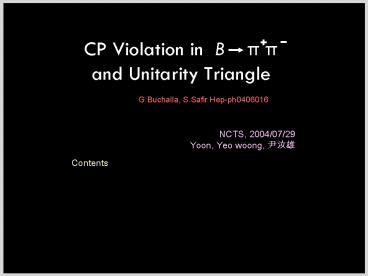CP Violation in B p p and Unitarity Triangle - PowerPoint PPT Presentation
1 / 11
Title:
CP Violation in B p p and Unitarity Triangle
Description:
CP Violation in B p p. and Unitarity Triangle. Basic Formula. QCD Factorization ... 2. Neglecting f, dependence of ? on r comes through merely factor (1 r ) ... – PowerPoint PPT presentation
Number of Views:35
Avg rating:3.0/5.0
Title: CP Violation in B p p and Unitarity Triangle
1
CP Violation in B p p and
Unitarity Triangle
G.Buchalla, S.Safir Hep-ph0406016
NCTS, 2004/07/29 Yoon, Yeo woong, ???
2
CPV in B ?pp- and Unitary Triangle, 1.Basic
Formula
2/11
Unitary Triangle
3
CPV in B ?pp- and Unitary Triangle, 1.Basic
Formula
3/11
Feynman Diagrams
4
CPV in B ?pp- and Unitary Triangle, 1.Basic
Formula
4/11
- BaBar, Heavy Flavor Averaging group
5
CPV in B ?pp- and Unitary Triangle, 2. QCD
Factorization
5/11
M.Beneke NPB606(2001)245
6
CPV in B ?pp- and Unitary Triangle, 2. QCD
Factorization
6/11
Type1 variation of input parameters Type2 model
estimates for power correction
Uncertainty
?
?
?
?
7
CPV in B ?pp- and Unitary Triangle, 3.
Phenomenological Analysis
7/11
8
CPV in B ?pp- and Unitary Triangle, 3.
Phenomenological Analysis
8/11
9
CPV in B ?pp- and Unitary Triangle, 3.
Phenomenological Analysis
9/11
New Physics contribution may modify the phase of
Bd-Bd mixing fd . Then sin2ß from B?J/? Ks should
be replaced by sin2fd.
Using (from theory)
(from experiment), we obtain
10
CPV in B ?pp- and Unitary Triangle, 3.
Phenomenological Analysis
10/11
Direct CP violation
New Physic may invalidate ? fit.
C is maximized where
11
CPV in B ?pp- and Unitary Triangle, 4. Conclusion
11/11
- ?, ? can be obtained in closed form as function
of observables t, S and hadronic penguin
parameters r,f. - The sensitivity on the hadronic quantities, is
very weak. - 1. There are no first-order corrections in f.
Moderate f is negligible 2. Neglecting f,
dependence of ? on r comes through merely factor
(1 r ) The impact of the uncertainty in r
0.1 is greatly reduced - The parameters ?, 1- ?, Rt and ? are bounded from
below, depending only on t, S and essentially
without relying on hadronic input. - Direct CP violation parameter C depends much
stronger on hadronic input than S, but gives
complementary information and can constrain r ,
f within the SM. - An alternative analysis of S and C especially
suitable for the presence of anew-physics phase
in Bd-Bd mixing was discussed - This analysis should be useful for interpreting
the forthcoming experimental measurements of CP
violation in B?pp- decays in a transparent way
and help to achieve a reliable control over
theoretical uncertainties.































